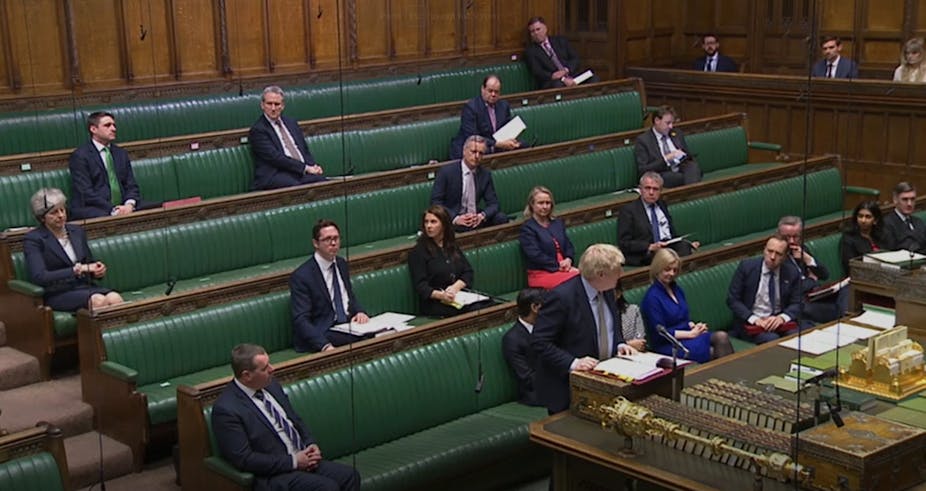As the coronavirus pandemic spreads, there is substantial debate around whether the UK parliament should continue to operate. MPs are still meeting in Westminster, despite official government advice against gathering in groups.
Many of the disagreements about whether this should continue stem from different understandings of parliament’s symbolic importance, and how this importance should be realised in practice.
While it might seem obvious that the current situation cannot go on, parliament plays an incredibly important role in the public consciousness. Shutting down is therefore a symbolic act. And during a time of national crisis, such an act has even more resonance.
To take one recent example, emergency legislation handing the government extra powers to deal with the coronavirus outbreak is being “nodded through” parliament, without debate. Normally, legislation would be discussed and interrogated by opposition parties but on this occasion, there will be none of the usual procedure.
Health Minister Edward Argar praised this decision as “a prime example of how we can work together during this crisis”. He was suggesting that MPs throwing out the normal processes in the interests of keeping things moving showed how we can all collaborate in the face of adversity.
However, when we consider broader recommendations to avoid gatherings, and to work from home whenever possible, what example does this really set?
The lack of clear or easy answers relates back to an inherent complexity in parliamentary decision-making. The significance of these decisions is not only practical. It is symbolic – an “example” of best practice in public space.
Parliamentary discussions and decisions have never been so visible, or so symbolically important. Parliamentarians appear increasingly aware of this, as we can see through a comparison with other pandemics.
Spanish flu
“Is it a fact that a sure preventative against influenza is cocoa taken three times a day?”
Claude Lowther’s terrifyingly quaint question on October 30 1918 (while MP for Eskdale) was one of the first recorded mentions of the Spanish influenza pandemic of 1918-20 in parliament. The virus had already reached the UK (and parliament) by this point. Prime Minister David Lloyd George had been infected back in September of that year, spending ten days incapacitated.
During its first wave in the spring of 1918, there were only two mentions of influenza in parliament (both on May 28). The first was a brief mention during a House of Commons discussion on pensions. The second was a government minister in the House of Lords, bemoaning his recent treatment by the press as “a minor kind of infliction … such as influenza or measles”.
The way parliamentarians discussed the influenza, at this crucial time for the UK, was symbolic in its own right. They suggested a detachment from the issue and its seriousness, as well as a lack of basic understanding. When the influenza was discussed at all, it was largely in terms of its economic and industrial impact (including how it would affect coal supplies) rather than public health.
The situation is very different in 2020 and the relative speed and urgency of discussion about the coronavirus is just as symbolic. Matt Hancock, the secretary of state for health and social care, was providing periodic updates as soon as late January. This demonstrated a level of urgency and seriousness that was not only an example for the parliamentary discussions to follow, but for the citizenry as well.

These are vital points to bear in mind when discussing the likelihood of closing parliament. It is possible to argue that parliament should close for the sake of public health, and to avoid MPs “becoming the very vectors that we’re trying to shut down”, as the Scottish National Party’s Carol Monaghan put it. However, it is also arguable that, in staying open, parliament can continue to set examples of best practice and guide public discourse.
MPs play a key role here, in setting the tone of public discussion. However, the question remains as to whether the importance of parliament (and parliamentarians) to UK democracy will be used to validate closure (for the sake of public health) or continuation (for the sake of fulfilling key democratic functions).
Symbolic silence
Parliament was postponed during the Great Plague of 1665-6 in London and ultimately left London to sit in Oxford in October 1665. This had happened before in 1625, again because of the plague. Oxford hosted parliament four times during this century (including during the civil war).
So why wasn’t parliament suspended in 1918 during the devastating Spanish influenza pandemic? The crisis unfolded as the first world war still raged; hence, any decision (including sending MPs away) would have been symbolically important to domestic morale. It would also send a message to the world stage, including to enemies. This also explains the censorship of any information that could undermine morale or convey weakness.
And because the media (along with the public) simply didn’t have the same access to parliament as it does today, there was less reporting of events in the chamber. The impetus in 1918 was more on international affairs than on citizens.
In the 21st century, journalists are embedded in parliament and social media enables politicians to communicate instantly with the general public. This has all been transformative in opening parliament up to public engagement.
What was said and done inside parliament in 1918 mattered (or was seen to matter) to overseas allies and enemies, while the wider public had less direct access to the debate. In the modern age, what is said and done inside parliament matters to citizens in a way that simply wasn’t possible back then.
This does not constitute a recommendation either way (in terms of temporarily closing parliament, for example, or relocating it online). Parliament is important because it symbolises best practice – to MPs, and to citizens in general – in public space. It remains to be seen whether parliament shuts down because it is important, or whether it continues because it is important.

